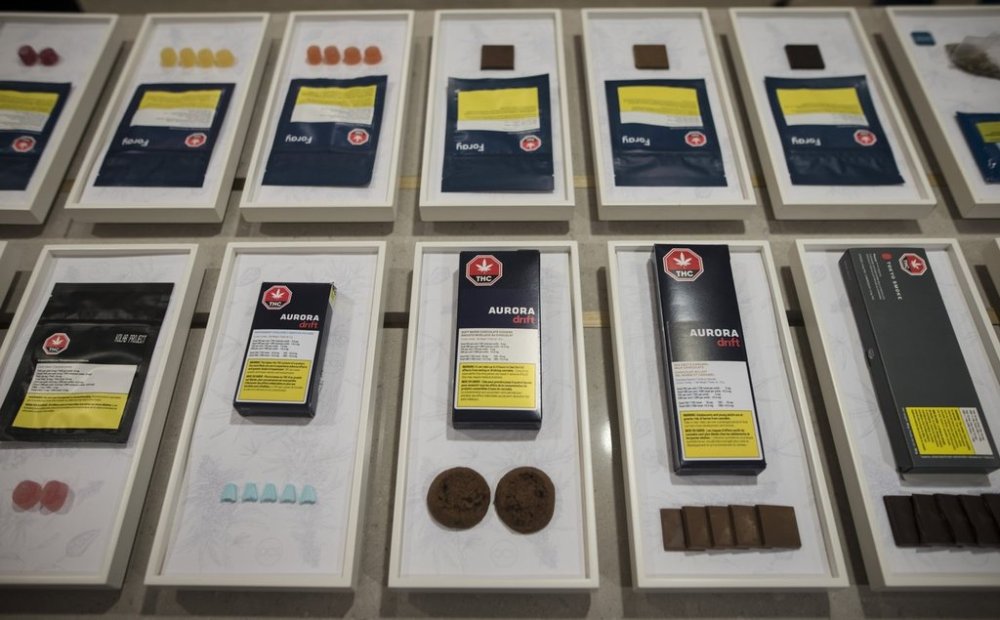Federal, provincial governments raked in more than $5.4B in cannabis tax revenue
Advertisement
Read this article for free:
or
Already have an account? Log in here »
To continue reading, please subscribe:
Monthly Digital Subscription
$0 for the first 4 weeks*
- Enjoy unlimited reading on winnipegfreepress.com
- Read the E-Edition, our digital replica newspaper
- Access News Break, our award-winning app
- Play interactive puzzles
*No charge for 4 weeks then price increases to the regular rate of $19.00 plus GST every four weeks. Offer available to new and qualified returning subscribers only. Cancel any time.
Monthly Digital Subscription
$4.75/week*
- Enjoy unlimited reading on winnipegfreepress.com
- Read the E-Edition, our digital replica newspaper
- Access News Break, our award-winning app
- Play interactive puzzles
*Billed as $19 plus GST every four weeks. Cancel any time.
To continue reading, please subscribe:
Add Free Press access to your Brandon Sun subscription for only an additional
$1 for the first 4 weeks*
*Your next subscription payment will increase by $1.00 and you will be charged $16.99 plus GST for four weeks. After four weeks, your payment will increase to $23.99 plus GST every four weeks.
Read unlimited articles for free today:
or
Already have an account? Log in here »
OTTAWA – Ottawa and the provinces raked in more than $5.4 billion in cannabis tax revenue since the drug was legalized for recreational use in October 2018.
The federal government has collected $1.2 billion, with the remaining $4.2 billion going to provincial coffers.
Ontario took in the greatest provincial share of revenue — $1.5 billion — with Alberta coming in second at just over $1 billion, despite having less than a third of Ontario’s population.

Alberta collected the most per capita tax revenue of any province since recreational cannabis was legalized, pulling in about $210 per person.
In terms of per capita tax revenue, Alberta easily surpassed its nearest rivals the Northwest Territories, which collected $135.80 per person. They are followed by the Yukon at $126.35, Saskatchewan at $121.55 and Newfoundland and Labrador at $113.65.
Quebec has the lowest per capita share of recreational cannabis tax revenue, at just $55.31 per person since October 2018.
The information comes in an answer to a House of Commons order paper question from Quebec Conservative MP Luc Berthold, who asked for a breakdown of cannabis tax revenue and spending on associated prevention programs.
Federal tax revenue does fall short of the government’s original projects. In the 2018-19 budget, the government expected to see $690 million in cannabis tax revenue over the first five years of recreational legalization. Ottawa collected about $567 million by the end of the 2022-23 fiscal year.
Cannabis education spending is well below the original projection. The 2018-19 budget projected $83 million in spending over the first five years of recreational legalization. However, Health Canada reports it spent about $21.6 million on education and prevention programs since recreational cannabis use was legalized.
More than half of that — $13 million — was spent in the 2018-19 fiscal year alone.
The national health agency spent less than $500,000 in total on cannabis education and prevention programs in the 2020-21 and 2021-22 fiscal years — the peak of the COVID-19 pandemic. Health Canada cannabis program spending increased in each subsequent complete tax year since then, and hit $2.3 million in 2024-25.
The federal government also contributed about $29.6 million to 26 other cannabis education and prevention programs since 2018.
This data does not include tax revenue from Manitoba because that province is the only one that does not take part in the federally managed cannabis taxation framework.
The tax revenue data for 2025 is incomplete, covering April 1 to Aug. 31.
This report by The Canadian Press was first published Nov. 25, 2025.

